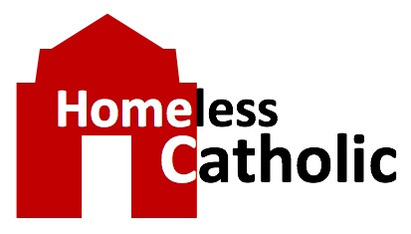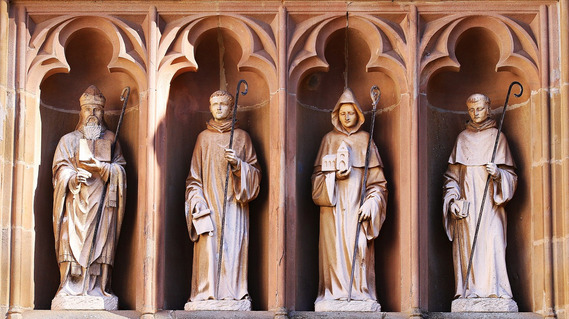Going to School with the Saints
As I began my quest for a deeper understanding of today’s alternate reading, I wondered why this is a memorial and not a feast. I wasn’t even sure if that was a valid question. "Memorials are the lowest rank and are simply the celebrations of most of the saints. The Gloria is not said on these days.”
OK! So, today’s memorial is simply a celebration of a couple saints.
Image by NoName_13
Going to School with the Saints
By Steve Leininger
https://bible.usccb.org/bible/readings/091623.cfm
II Corinthians 4:7-15
John 17:11-19
Today’s daily readings presented me one of those “fork in the road” moments. I could use the “normal readings” or I could take the path labeled “Memorial of Saint Cornelius, pope and martyr, and Saint Cyprian, bishop and martyr.” I will admit to taking the usual path and finding, among other things, that a rotten tree does not bear good fruit and that a person who built a house on the ground without a foundation has made a poor life choice. I think I’ve reflected on these before and backtracked to the alternate readings.
Memorial of Saint Cornelius, pope and martyr, and Saint Cyprian, bishop and martyr
With the luxury of time and several online resources, I set out on a journey of discovery and inspiration. My first pass though the readings to celebrate the memorial of Saint Cornelius and Saint Cyprian had material that helped reinforce those values which we contemplate when we remember martyrs. From the memorial title, we already know that both saints had been martyred, but who were they, why were they martyred, and why are they saints? And why are they celebrated together?
The readings do not give a clue about either saint, which was not unexpected, because both were active in the mid 3rd century, during the time of great Roman persecution of Christians. This of course was more than a hundred years after what we know as the New Testament was written. We will return to the readings in a bit.
Memorial, that’s like a feast, right?
As I began my quest for a deeper understanding of today’s alternate reading, I wondered why this is a memorial and not a feast. I wasn’t even sure if that was a valid question. It turns out that I’m not the only one who has asked that question. According to Catholic.com:
“A solemnity is the highest rank of celebration. Easter, Christmas, All Saints Day, the Ascension, Corpus Christi, and other celebrations of events in our Lord’s life on earth and certain saints are solemnities. The Gloria and Creed are always said on such days.
Feasts are the next rank. They consist of the celebration of certain saints like the feast of the Archangels or most of the Apostles. The Gloria is required on these days, but not the Creed.
Memorials are the lowest rank and are simply the celebrations of most of the saints. The Gloria is not said on these days.”
OK! So, today’s memorial is simply a celebration of a couple saints.
How many Catholic saints are there?
When asked, the folks at Catholic.org (a different reference website) stated:
“The short answer is, "more than 10,000." In fact, it is probably more than 11,000 by now. The commonly cited 10,000 figure is already a decade old, dating back to the end of Pope Benedict XVI's pontificate, and since then there's been some mass canonizations. Specifically, the 799 residents of Otranto, Italy, who were killed by the Ottomans in 1480, for refusing to convert to Islam.
A problem for the Church is there isn't an official, complete, comprehensive list of these 11,000 names. And in fact, not all the names exist. For example, there is really no way for the Church to know the identities of every person killed by the Ottomans in 1480. The Church knows they are saints because they gave their lives for the faith, but we do not know their names.
You see, in the ancient world, many people became saints by virtue of broad acclaim. There existed no formal process whereby the Church recognized sainthood, so it probably worked more like a popularity contest. If people liked you, a lot, or the stories others told about you, you were considered a saint. In reality, some of these figures either never existed, were less than impeccable, or were even mashups of several popular people. There's just no way of knowing for sure.”
I feel I know what a martyr is, but refresh my memory
Wikipedia was my convenient source for the definition of martyr:
“In Christianity, a martyr is a person considered to have died because of their testimony for Jesus or faith in Jesus. In years of the early church, stories depict this often occurring through death by sawing, stoning, crucifixion, burning at the stake or other forms of torture and capital punishment. The word martyr comes from the Greek word mártys, which means "witness" or "testimony".”
A short but brutal history lesson
Most of what we know about Saint Cornelius and Saint Cyprian is directly connected to the ongoing persecutions of the followers of Christ around the year 250. Emperor Decius issued an edict ordering that everyone in the Empire, with the exception of Jews, must sacrifice and burn incense to the Roman gods and to the well-being of the Emperor in the presence of a Roman magistrate, and get a written certificate attesting to the same. On 20 January 250, during the Decian persecution, Pope Fabian was martyred and the persecution was so fierce that it proved impossible to elect a successor, with the papal seat remaining vacant for a year.
Christians who submitted to pressure and made public sacrifice were called lapsed or lapsi. Upon completion of sacrifice, individuals received a certificate of sacrifice, or libellus, a legal document proving conformity with Roman religion. To avoid this test, many members of the clergy fled, leaving their communities without leadership. In their absence, lay people who had not lapsed, called confessors, filled their leadership role.
After the execution of Pope Fabian, Bishop Cyprian of Carthage went into hiding. When he returned from hiding to Carthage, he found these confessors assumed authority of clergy, especially forgiveness of sin. Although many confessors willingly relinquished their positions of authority upon the clergies' return, some attempted to retain their positions. Cyprian called a council in 251 AD to address this problem, the root of which was the status of the lapsi. Confessors tended to accept lapsi back into communion, while the clergy demanded harsher punishments.
Pope Cornelius was the bishop of Rome from March 251 until his martyrdom in June 253. He was pope during and following a period of persecution of the church, while a schism occurred over how repentant church members who had practiced pagan sacrifices to protect themselves could be readmitted to the church. This difference of opinion in how to treat the lapsi was part of a larger picture which threatened the cohesion of the Christian church at that time. After Fabian’s execution, Cornelius succeeded him as Pope. Cornelius and Cyprian believed that the lapsi could be restored to communion, but only through repentance and penance.
A Roman priest named Novatian believed that lapsi should not be allowed to return to the church as they could not be forgiven on earth, but only by God. Consecrated as pope by three bishops in 251, Novation adopted a more rigorous position than the established Pope Cornelius. Novatian was shortly afterwards excommunicated: the schismatic church which he established persisted for several centuries. For causing a schism, or split, in the church, Novation is considered by the Catholic Church to have been an antipope between 251 and 258.
Cyprian was able to avoid full schism by identifying five categories of lapsi and assigning penance appropriate to each. The reason we are memorializing Saint Cornelius and Saint Cyprian today is because of their belief in God’s grace and forgiveness that held the church together in times of severe persecution.
Today’s readings
I used the alternate readings for today, which can be found here:
https://bible.usccb.org/bible/readings/0916-memorial-cornelius-cyprian.cfm
In the first reading, Saint Paul is speaking to those who carry and deliver the message in “earthen vessels”, the new ministers of the church, conjuring up images of how fragile humans are. The message can be summarized by the verse just before the readings:
For God who said, “Let light shine out of darkness,” has shone in our hearts to bring to light the knowledge of the glory of God on the face of Jesus Christ. [2 Corinthians 4:6]
Paul goes on to say:
We are afflicted in every way, but not constrained; perplexed, but not driven to despair; persecuted, but not abandoned; struck down, but not destroyed; always carrying about in the body the dying of Jesus, so that the life of Jesus may also be manifested in our body; For we who live are constantly being given up to death for the sake of Jesus, so that the life of Jesus may be manifested in our mortal flesh. [2 Corinthians 4:8-11]
Being the messenger is tough work! But it is this delivering of the message, even though we may die in process, the life of the good news of Jesus will live on because of our efforts.
In the New Testament, chapters 14–17 of the Gospel of John are known as the Farewell Discourse given by Jesus to eleven of his disciples immediately after the conclusion of the Last Supper in Jerusalem, the night before his crucifixion. Today’s Gospel reading if from John 17:11-19, a chapter often called the “high priestly prayer” of Jesus. He speaks as intercessor, with words addressed directly to the Father and not to the disciples, who supposedly only overhear.
Jesus raised his eyes to heaven and prayed, saying:
"Holy Father, keep them in your name that you have given me,
so that they may be one just as we are one.
When I was with them I protected them in your name that you gave me,
and I guarded them, and none of them was lost
except the son of destruction,
in order that the Scripture might be fulfilled.
But now I am coming to you.
I speak this in the world
so that they may share my joy completely.
I gave them your word, and the world hated them,
because they do not belong to the world
any more than I belong to the world.
I do not ask that you take them out of the world
but that you keep them from the Evil One.
They do not belong to the world
any more than I belong to the world.
Consecrate them in the truth.
Your word is truth.
As you sent me into the world,
so I sent them into the world.
And I consecrate myself for them,
so that they also may be consecrated in truth." [John 17:11-19]
I believe it was these words that in part gave great strength to our two patron saints today which guided Saint Cornelius and Saint Cyprian to speak the truth even at their own peril more than 200 years later.

